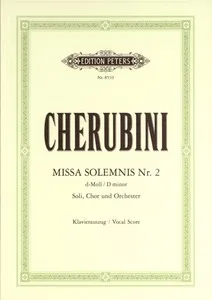An improvement upon its predecessor
Cherubini's earlier Mass in F Major 'di Chimay' from 1809, which I discussed HERE, was, at nearly 73 minutes, pushing the lengths of just being too long, even though there were some interesting individualized moments.
Well, now we have Cherubini's 1811 Missa Solemnis in D minor coming in at over 77 minutes. Yet, the work improves at almost every turn compared to its predecessor, as does this recording.
The Music
The subtle minor march in the opening of the Kyrie is ear-catching, and thankfully is brought back in its last third. The whole movement is rather moody; an excellent start.
The Gloria is the place where we see the greatest leap forward in inspiration from Cherubini. Cherubini writes five musical sections, and each are rather different. While everyone expects the opening Gloria to be bursting with energy, and it is, it is the leaping Laudamus Te portion which thrills, almost Handel-ian in its pomposity and repeated motivity. With the Gratias Agimus, we see the progression of Cherubini's orchestrations, from the earlier string-laden work, now giving large portions over to the winds, which interact intimately with the vocal soloists.
What fun the Qui Tollis is! That rolling string motif at its ope continues throughout, and when the men bellow at their first entrance, it is an absolute thrill. The end of the soloist-centered Quoniam is startling a cappella. It bridges into the final Cum Sancto Spiritu fugue, which must be an absolute bear to perform, for it goes on and on and on at extreme ranges and at strong volumes. Not only that, but the chorus has to go right on and open up the following Credo, which is equally high spirited.
Well, he does; and while the opening Credo follows in a similar spirit from the end of the Gloria, the Credo has more of a heavy swing to it, to give the start a bit of a difference. If the Quoniam was effective for its ending being a cappella, the entire Et Incarnatus is a cappella with wind interludes. Cherubini adds a treble soloist and a baritone soloist to make a sextet, often split into two trio portions, and it is quite the effect.
The Crucifixus impresses for opposite reasons; the choral parts are written only on one note the entire length, while the orchestra moves the harmonies around the chorus. It is a unique technique that is effective with everything going on around the singing. The Amen section concludes in a other fugal episode.
The work is still too long, but I suppose it could be seen as an overblown precursor to Beethoven's monumental Missa Solemnis.
The Recording
The earlier 'di Chimay' Mass was recorded after this one. Its group of vocal soloists was not an ideal group, one important aspect this recording under review greatly improves upon. A fine quartet!
The chorus also seems more responsive to the wide variety of demands set upon them as well, and they never flags despite being set upon by extreme ranges at constant loud volumes. Of course that earlier Mass was written for only 3-part chorus and three soloists, so perhaps comparison is moot.
While the title of this Mass is succeeded by 'for Prince Esterházy', not mention is made in the liner notes why this tribute was made. Perhaps it was due to the departure that year of Johann Nepomuk Hummel for the princess' name day, which is usually occasioned by a Mass?
Otherwise, the Bavarian forces are excellent and Riccardo Muti's leadership seems inspired. The only quibble (not mine!) could be the modern instruments vs period ones, but time will tell if more recordings will be offered of these rarely heard works in the future. At least we have these outstanding performances!
Listen on YouTube
Work
Missa Solemnis in D minorI. Kyrie (12.27)
II. Gloria (27.55)
III. Credo (17.27)
IV. Sanctus (2.01)
V. Benedictus (7.13)
VI. Agnus Dei (9.56)
Soloists
Camilla Tilling, soprano
Sara Fulgoni, contralto
Kurt Streit, tenor
Tómas Tómasson, bass
Ensembles
Bavarian Radio Choir
Bavarian Radio Symphony Orchestra
Riccardo Muti, conductor
Label: EMI
Year: 2001
Total Timing: 77.07
Cherubini will not return to these lengths again in succeeding Mass settings, and that is probably for the better.
Still, these early works are presented in their best possibly light by Muti and company. Bravo!
Find more Cherubini recordings HERE!




Comments
Post a Comment